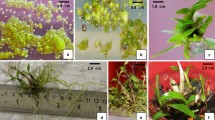Abstract.
An efficient in vitro propagation method using enhanced axillary branching cultures produced plants from nodal explants of three mature, elite tea clones: diploid UPASI 26 and UPASI 27 (2n=2x=30) representing Camellia sinensis (China type) and triploid UPASI 3 (2n=3x=45) representing C. assamica ssp. assamica (Assam-India type). The genetic fidelity of the micropropagated plants of these three tea clones was assessed by analysing their nuclear, mitochondrial (mt), and chloroplast (cp) genomes using multiple molecular DNA markers. A total of 465, 446 and 462 genetic loci were produced with RFLP, RAPD and ISSR fingerprinting in the micropropagated plants and the corresponding mother plant of C. sinensis clone U (UPASI) 26, and C. assamica ssp. assamica clones U3 and U27, respectively. RFLP fingerprinting was performed using six restriction endonuclease digests and 14 mt and cp gene probes in 84 enzyme-probe combinations. For PCR fingerprinting, 50 RAPD and SSR primers were used for amplifications. The micropropagated plants of both the U3 and U27 clones revealed complete stability in the 462 and 446 genetic loci analysed. In comparison, 36 (7.7%) of the 465 loci were polymorphic among micropropagated plants of the U26 clone. The observed polymorphic loci were not restricted to a particular genome (nuclear or organellar), although a relatively low (7.43%) level of polymorphism was observed in the nuclear as compared to the mt genome (16.3%). ISSR fingerprinting (12.8%) detected more polymorphic loci than RAPD fingerprinting (4.28%). No polymorphism was observed in the cp genome of the micropropagated plants of the three tea clones. The rigorous screening of nuclear and two organellar genomes has demonstrated, for the first time, subtle genetic variation at the DNA sequence level in organized meristem-derived micropropagated plants of tea. Clearly, this is another example demonstrating that organized meristem cultures are not always genetically true-to-type. The genomic changes in tea clones are genotype dependent rather than culture condition dependent.
Similar content being viewed by others
Author information
Authors and Affiliations
Additional information
Electronic Publication
Rights and permissions
About this article
Cite this article
Devarumath, .R., Nandy, .S., Rani, .V. et al. RAPD, ISSR and RFLP fingerprints as useful markers to evaluate genetic integrity of micropropagated plants of three diploid and triploid elite tea clones representing Camellia sinensis (China type) and C. assamica ssp. assamica (Assam-India type). Plant Cell Rep 21, 166–173 (2002). https://doi.org/10.1007/s00299-002-0496-2
Received:
Revised:
Accepted:
Issue Date:
DOI: https://doi.org/10.1007/s00299-002-0496-2




